

Global Education Summit in Washington DC. I was gobsmacked when in June of this year I received a personal invitation from the Bill and Melinda Gates Foundation and the Sutton Trust to attend a Summit on 3 and 4 November 2014 to discuss and share effective teacher development strategies. 100 attendees from the US, England, Finland, The Netherlands, Canada, Ireland, Singapore, Hong Kong, New Zealand and Australia descended on the Omni Shoreham Hotel in Washington DC, where the Beetles have played and Kings, Queens and world leaders have stayed.

I was one of four delegates selected to represent Australia. The event was covered by the UK-based, Times Education Supplement. The purpose of the two days was to share best practices in teacher development, with the hope of identifying the most effective strategies that could then be replicated in schools across the globe, but particularly in schools that serve the socially disadvantaged (a key focus of the Sutton Trust). The four Australia delegates “teaching is rocket science.” Putting off Some Horrible Task? Try These 7 Tips. It’s a Secret of Adulthood: Happiness doesn’t always make me feel happy.

Often, I know I’d be happier if I do something I really don’t feel like doing. Making that phone call. Dealing with tech support. Writing that email. New Research: Students Benefit from Learning That Intelligence Is Not Fixed. Arten Popov Teaching students that intelligence can grow and blossom with effort – rather than being a fixed trait they’re just born with – is gaining traction in progressive education circles.
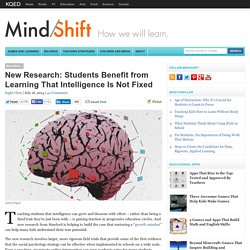
And new research from Stanford is helping to build the case that nurturing a “growth mindset” can help many kids understand their true potential. The new research involves larger, more rigorous field trials that provide some of the first evidence that the social psychology strategy can be effective when implemented in schools on a wide scale. Inspire learning through emotional connections.
"Inspired to change the way we work.
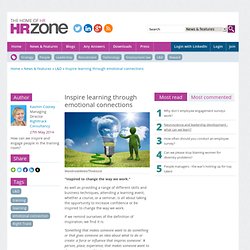
" As well as providing a range of different skills and business techniques, attending a learning event, whether a course, or a seminar, is all about taking the opportunity to increase confidence or be inspired to change the way we work. If we remind ourselves of the definition of inspiration, we find it is: ‘Something that makes someone want to do something or that gives someone an idea about what to do or create: a force or influence that inspires someone’. ‘A person, place, experience, that makes someone want to do or create something’. But when a trainer is facilitating learning, how do they inspire other people to adapt to new ideas, to take up new skills, to be more confident or to make changes in their working practices? Are You Mentally Tough? Share.
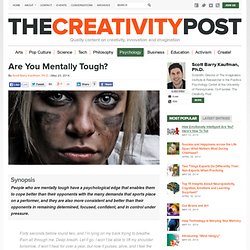
Positive psychology. Return to Main page.
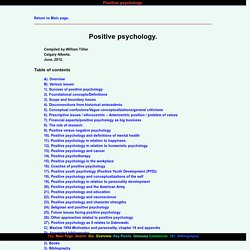
Compiled by William Tillier Calgary Alberta. June, 2012. Table of contents. Eden Kozlowski: Can Christians Practice Mindfulness? This topic has been buzzing around me lately, so it's time to write about it.

Let's see if this blog creates more understanding or maybe even more controversy? Either way, I would like this piece to set the tone for a thoughtful, kind and open dialogue. So, my answer... a resounding yes, yes and ooohhh, yes. Let me stress, I am writing about this from the perspective of the mindfulness practice that I teach in businesses and educational settings.
How the brain works. The Kindness Zone. All to often when we are having a bad day, it's because we are giving ourselves a harder time than we deserve.

Just for today, be kind to yourself and perform at least one random act of kindness to someone else. Redefining Success Through Well-Being What is success, and how does it relate to our work life?

How about our personal life? Recently I have been thinking about this ever-changing interpretation. The traditional definition of success is "the fact of achieving wealth, respect or fame. " The Science Behind What Makes Us Happy. The secret to happiness is having good relationships.
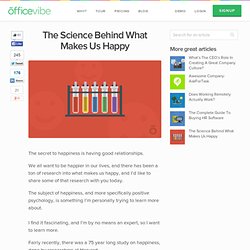
We all want to be happier in our lives, and there has been a ton of research into what makes us happy, and I’d like to share some of that research with you today. The subject of happiness, and more specifically positive psychology, is something I’m personally trying to learn more about. I find it fascinating, and I’m by no means an expert, so I want to learn more. Fairly recently, there was a 75 year long study on happiness, done by researchers at Harvard. The study’s most important finding is that the only thing that matters in life is relationships.
Other interesting findings were that more money doesn’t lead to more happiness (we knew that already), and we can all become happier, no matter how bad we have it. Appreciative Inquiry Resources @JeremyScrivens #appreciativeinquiry. Appreciative Inquiry References & Sources related to the KINSHIP enterprise February 27th Business Leader Luncheon with Jeremy Scrivens. Topic: How to take advantage of social media to innovate & grow your business without the risks Here is a MASSIVE list of reference material for you. Please scan though for what interests you the most. 10 Risks Happy People Take Every Day. Email “You cannot protect yourself from sadness without protecting yourself from happiness.” ―Jonathan Foer. Why Valuing Happiness Is a Good Thing After All. In 2011, a paper came out in which the authors declared that wanting to be happy paradoxically makes it so that you can't actually be happy (Mauss, Tamir, Anderson & Savino, 2011).
This paper is described in many other blog posts (here, for example), and so I won't spend too much time recounting that previous work here. In a nutshell, though, they found that people who really want to be happy are inevitably disappointed by whatever they experience. Even if they feel pretty good, it's not the elation they expected, so by comparison with their hopes, their experience seems pretty bad. The end result of this study being published was a series of headlines saying "Stop Trying to Be Happy! Boosting Happiness: One of the Best Exercises You Can Do. One of the most popular exercises in the science of positive psychology (some argue it is the single most popular exercise) is referred to as “use your signature strengths in new ways.”
But what does this exercise mean? How do you make the most of it to benefit yourself and others? Letting Go of the Past – A Story of Two Monks and a Maiden. I am writing this looking out over the winding path of the Mekong River in Luang Prabang, Laos. As I sip my tea, I allow my mind to become engaged in the array of beautiful sounds emitting from nature’s bounty; the trees subtly whistle in the light, warm breeze, a small lizard scuttles across fallen leaves, birds chirp in the shade and the sound of fisherman casting their nets as they wade in the shallows pricks my ears to attention. Positive Psychology Worth-it Projects.
7 Reasons Why We Should Be Giving More Hugs. Admit it: Nothing gives you comfort quite like a warm hug. Dr. Martin Seligman - The Three Blessings Exercise. What Mindfulness Is. 2morrowknight: "10 Risks Happy People Take... Happy Habits - how do you score? The Importance of Gratitude. To educate yourself for the feeling of gratitude means to take nothing for granted, but to always seek out and value the kindness that will stand behind the action. Nothing that is done for you is a matter of course. Robert Emmons: Benefits of Gratitude. Robert Emmons: Benefits of Gratitude. How to Get Your Employees to Think Strategically. Bucket Lists and Positive Psychology. Most men lead lives of quiet desperation and go to the grave with the song still in them. - Henry David Thoreau. 15 Tips for Public Speaking That Apply to Shining at Work, and Just About Everywhere Else. Why Self-Confidence Should Be Your Top Goal This Year.
To Enable Learning, Put (Emotional) Safety First. Building a secure, supportive classroom environment is essential for young brains to learn. Credit: iStockphoto. Free Hugs: by Wellbeing, Motivation and Performance students. Are You A Giver Or Taker At Work? The Neuroscience of Why Gratitude Makes Us Healthier, by Ocean Robbins. A Whole New Way To Think About Stress That Changes Everything We've Been Taught. 5 Easy Ways to Balance Your Business and Personal Life
Strengths Have Many Faces. Fishbowls for training. Other Lenses on Strengths. Can you teach grit? Creativity requires TIME. Coloring your Work Life.